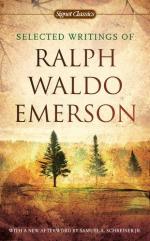
|
| Name: _________________________ | Period: ___________________ |
This test consists of 5 multiple choice questions, 5 short answer questions, and 10 short essay questions.
Multiple Choice Questions
1. What is the direction of nature and human consciousness?
(a) An unlighted path.
(b) Walking an endless circle.
(c) Like a labyrinth that turns in on itself.
(d) The creation of ever-widening circles.
2. What view does Emerson take of human love in "Love"?
(a) Logical.
(b) Spiritual.
(c) Emotional.
(d) Physical.
3. Which of the following is NOT a characteristic of the best gift, according to "Gifts"?
(a) Something that reflects the giver.
(b) Something that acknowledges an essential truth about the receiver.
(c) Something that comes directly from the giver.
(d) Something that acknowledges an essential truth about the giver.
4. What is the primary tool of the poet?
(a) Imagination.
(b) Truth.
(c) Language.
(d) Experience.
5. Each person has his or her own vocation that can be discovered by ______.
(a) The direction of the mind.
(b) The person's passions.
(c) Psychological evaluation.
(d) Cultural instruction.
Short Answer Questions
1. How is a new experience of reality evidenced, according to "Art"?
2. What natural phenomenon does Emerson use as a comparison for character in his essay "Character"?
3. According to Emerson, what is a faint reflection of proper manners?
4. How was "The Transcendentalist" originally delivered?
5. Which of the following is the Gospel that makes mention of repetition of the Lord's Supper in worship, according to Emerson?
Short Essay Questions
1. According to "The Lord's Supper", what does Emerson say is the purpose of the Lord's Supper in Christian ritual? What does he say should be the focus?
2. What are the categories Emerson divides the world into in his essay "Nature"?
3. What is the benefit of friendship, according to "Friendship"? What is the irony in Emerson's essay?
4. What does Emerson think of Plato, according to "Plato; or, the Philosopher"? What indicates this?
5. What two major failings of the church does Emerson explain in "An Address"?
6. According to "Self-Reliance", what is the relationship between conformity and being a man?
7. According to "The Poet", what is the effect of poets speaking the truth? How do poets speak the truth?
8. According to "Compensation", how does nature maintain balance? How can one maintain balance on earth?
9. What are the differences between materialism and idealism, according to "The Transcendentalist"?
10. According to "Art", from where does all art evolve? What is its purpose?
|
This section contains 821 words (approx. 3 pages at 300 words per page) |

|




